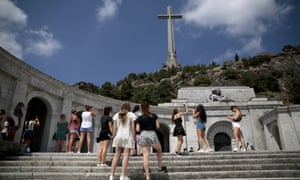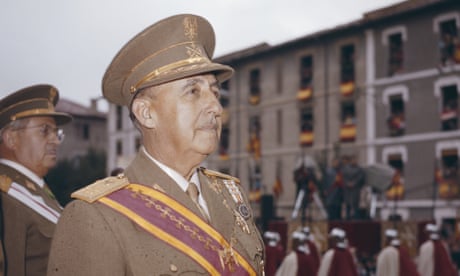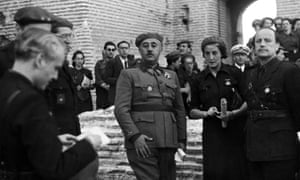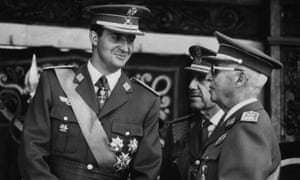Giles Tremlett
The fate of his burial monument is uncertain – why not turn it into a civil war museum, to warn of the horrors of fascism?
Fri 24 Aug 2018 15.55 BST
Last modified on Fri 24 Aug 2018 21.46 BST
Shares
1176
Comments378 ‘Looming high above the basilica, a 150-metre cross sits like a giant finger raised to the families of those assassinated by Franco’s regime.’ The Valley of the Fallen monument outside Madrid. Photograph: Andrea Comas/AP
‘Looming high above the basilica, a 150-metre cross sits like a giant finger raised to the families of those assassinated by Franco’s regime.’ The Valley of the Fallen monument outside Madrid. Photograph: Andrea Comas/AP
Before they buried Francisco Franco in 1975, a waiting mourner fell into the hole reserved for the Spanish dictator. The unconscious man had to be pulled out. More than four decades later, Spain’s socialist prime minister, Pedro Sánchez, has declared that Franco must now also be removed from the vast underground basilica the dictator had built at El Valle de Los Caídos – a dramatic, wild valley that overlooks the northern suburbs of Madrid. The government announced on Friday a new law giving it powers to dig up the grave, situated behind the basilica’s main altar, later this year.

Spanish government approves exhumation of Francisco Franco
So far, so good. The trouble is, however, that not only have we been here before, but that this measure on its own is not enough. For even if Franco goes, this will still be an obnoxious reminder of his 36-year rule; the ghostly home to the bones of 33,000 combatants of a civil war that he provoked by helping to lead a coup d’etat against democracy. Looming high above the basilica, a massive 150-metre tall granite cross sits like a giant finger raised to the families of those assassinated by his regime, to the victims of his political courts and to the families refused permission to take their dead elsewhere. Those dead are stuffed into damp, collapsing chambers that are invisible to visitors, who can only see Franco’s well-kept tomb and that of José Antonio Primo de Rivera – the ideologue and leader of Falange Española, the violent Spanish fascist movement.
What should happen to all of that? Some have suggested that the cross is so ghastly that it should be dynamited, along with the rest of the monument. That, however, misses the point. Erasing Franco’s symbols, rather than explaining them, does nothing to teach Spaniards what went wrong. Nor does the removal of his embalmed body, though this is a positive first step.
Sánchez knows that there is a much bigger and better solution – the one proposed by a commission set up by a previous socialist government five years ago, and roundly ignored since then. That proposal was to turn this morbid, decaying monument into a proper museum of national conciliation and remembrance.
Shares
1176
Comments378
 ‘Looming high above the basilica, a 150-metre cross sits like a giant finger raised to the families of those assassinated by Franco’s regime.’ The Valley of the Fallen monument outside Madrid. Photograph: Andrea Comas/AP
‘Looming high above the basilica, a 150-metre cross sits like a giant finger raised to the families of those assassinated by Franco’s regime.’ The Valley of the Fallen monument outside Madrid. Photograph: Andrea Comas/APBefore they buried Francisco Franco in 1975, a waiting mourner fell into the hole reserved for the Spanish dictator. The unconscious man had to be pulled out. More than four decades later, Spain’s socialist prime minister, Pedro Sánchez, has declared that Franco must now also be removed from the vast underground basilica the dictator had built at El Valle de Los Caídos – a dramatic, wild valley that overlooks the northern suburbs of Madrid. The government announced on Friday a new law giving it powers to dig up the grave, situated behind the basilica’s main altar, later this year.

Spanish government approves exhumation of Francisco Franco
So far, so good. The trouble is, however, that not only have we been here before, but that this measure on its own is not enough. For even if Franco goes, this will still be an obnoxious reminder of his 36-year rule; the ghostly home to the bones of 33,000 combatants of a civil war that he provoked by helping to lead a coup d’etat against democracy. Looming high above the basilica, a massive 150-metre tall granite cross sits like a giant finger raised to the families of those assassinated by his regime, to the victims of his political courts and to the families refused permission to take their dead elsewhere. Those dead are stuffed into damp, collapsing chambers that are invisible to visitors, who can only see Franco’s well-kept tomb and that of José Antonio Primo de Rivera – the ideologue and leader of Falange Española, the violent Spanish fascist movement.
What should happen to all of that? Some have suggested that the cross is so ghastly that it should be dynamited, along with the rest of the monument. That, however, misses the point. Erasing Franco’s symbols, rather than explaining them, does nothing to teach Spaniards what went wrong. Nor does the removal of his embalmed body, though this is a positive first step.
Sánchez knows that there is a much bigger and better solution – the one proposed by a commission set up by a previous socialist government five years ago, and roundly ignored since then. That proposal was to turn this morbid, decaying monument into a proper museum of national conciliation and remembrance.

‘Spaniards must come to terms with the fact that Franco did not act alone and that his crimes and achievements were aided by a whole tranche of Spanish society.’ Photograph: AP
The report, written by a committee of historians and anthropologists, calls for the valley to be radically transformed, or “resignified”. It can no longer be allowed to represent, as its founding documents state, Franco’s “glorious crusade” – meaning his Spanish, Roman Catholic version of fascism. Instead, with the names of the 33,000 dead to be inscribed on the vast esplanade outside, it would serve to recall the horrors of a fratricidal confrontation that inspired the most famous anti-war painting of all time, Pablo Picasso’s Guernica. The museum would also explain how this monument was created, why political prisoners were used to build it, and how people died during its 20-year construction. It would, in effect, oblige people to confront the past.
This is not an easy task. Spaniards must come to terms, for example, with the fact that Franco did not act alone and that his crimes and achievements (some economic progress, after all, was inevitable over almost four decades) were committed by a whole tranche of Spanish society, along with the dictator and his henchmen. “What did you do during the dictatorship, Abuelo (Grandad)?” is not a common question. Nor have Spaniards yet investigated the idea mooted by the Czech playwright-president Václav Havel (Spain, after all, is not unique in having had a totalitarian or authoritarian past) that the line between regime collaborators and victims often runs through people, rather than between them. How else does one explain that the founding editor of El País newspaper, for example, once ran Franco’s state television news?
Coming to terms with the past this way is uncomfortable, which is why it is so much easier to demolish it. Smaller monuments have already been removed. In Barcelona a massive, sculpted street monument to Primo de Rivera that was inaugurated in front of a crowd of stiff-armed local Francoists in the 1960s has gone. Its removal – and the absence of any reminder that the monument was ever there – helps reinforce the false idea there that local Francoists, like the future International Olympic Committee head Juan Antonio Samaranch, were few and far between.
The report, written by a committee of historians and anthropologists, calls for the valley to be radically transformed, or “resignified”. It can no longer be allowed to represent, as its founding documents state, Franco’s “glorious crusade” – meaning his Spanish, Roman Catholic version of fascism. Instead, with the names of the 33,000 dead to be inscribed on the vast esplanade outside, it would serve to recall the horrors of a fratricidal confrontation that inspired the most famous anti-war painting of all time, Pablo Picasso’s Guernica. The museum would also explain how this monument was created, why political prisoners were used to build it, and how people died during its 20-year construction. It would, in effect, oblige people to confront the past.
This is not an easy task. Spaniards must come to terms, for example, with the fact that Franco did not act alone and that his crimes and achievements (some economic progress, after all, was inevitable over almost four decades) were committed by a whole tranche of Spanish society, along with the dictator and his henchmen. “What did you do during the dictatorship, Abuelo (Grandad)?” is not a common question. Nor have Spaniards yet investigated the idea mooted by the Czech playwright-president Václav Havel (Spain, after all, is not unique in having had a totalitarian or authoritarian past) that the line between regime collaborators and victims often runs through people, rather than between them. How else does one explain that the founding editor of El País newspaper, for example, once ran Franco’s state television news?
Coming to terms with the past this way is uncomfortable, which is why it is so much easier to demolish it. Smaller monuments have already been removed. In Barcelona a massive, sculpted street monument to Primo de Rivera that was inaugurated in front of a crowd of stiff-armed local Francoists in the 1960s has gone. Its removal – and the absence of any reminder that the monument was ever there – helps reinforce the false idea there that local Francoists, like the future International Olympic Committee head Juan Antonio Samaranch, were few and far between.
Spanish fascism, it is worth remembering, was not a purely Castilian invention.
‘King Juan Carlos (left) once described Franco (right) as “that exceptional man whom Spain has been immensely fortunate to have”.’ Photograph: AFP/Getty Images
There is much else to explain. Spain’s civil war was a curtain-raiser for the second world war, which started soon after, and was also the first great fascist military victory in Europe. Without troops and air support from Hitler and Mussolini, this would have been impossible. Democracies like Britain, the United States and France – it should also be remembered – stood by and allowed that to happen. The Roman Catholic church, meanwhile, backed and blessed this “crusade” against an elected leftwing government. US support during the cold war then enabled Franco to survive for decades.
And what about Franco’s relationship to the Spanish monarchy which, after all, was something he himself reinstated?
There is much else to explain. Spain’s civil war was a curtain-raiser for the second world war, which started soon after, and was also the first great fascist military victory in Europe. Without troops and air support from Hitler and Mussolini, this would have been impossible. Democracies like Britain, the United States and France – it should also be remembered – stood by and allowed that to happen. The Roman Catholic church, meanwhile, backed and blessed this “crusade” against an elected leftwing government. US support during the cold war then enabled Franco to survive for decades.
And what about Franco’s relationship to the Spanish monarchy which, after all, was something he himself reinstated?
The successor he named, King Juan Carlos, oversaw Franco’s funeral and had once described him as ”that exceptional man whom Spain has been immensely fortunate to have”. He also acknowledged that his own political legitimacy was based on the civil war victory that cost “so much sad but necessary sacrifice and suffering”. Juan Carlos eventually led a remarkable democratic transformation, but the Franco family and the Valley of the Fallen remained protected. His son, King Felipe, recently approved the handing on of Franco’s dukedom to his granddaughter.
Nowhere is the church’s cosiness with dictatorship more obvious than in the Valley of the Fallen, where masses are said in Franco’s name. The prior of the Benedictine monastery that oversees the monuments here – and which refuses families permission to remove their dead – has said that he will only comply with the government’s demands if the king tells him to. Before he became a Benedictine monk, that prior, Santiago Carrera, had been a local election candidate for the Falange.
Franco’s body may be removed, but his ghostly presence will dominate the Valley of the Fallen, just as it still casts a pale shadow over Spain, until a far more radical transformation is completed. This could, and should, become Spain’s great civil war museum.
Nowhere is the church’s cosiness with dictatorship more obvious than in the Valley of the Fallen, where masses are said in Franco’s name. The prior of the Benedictine monastery that oversees the monuments here – and which refuses families permission to remove their dead – has said that he will only comply with the government’s demands if the king tells him to. Before he became a Benedictine monk, that prior, Santiago Carrera, had been a local election candidate for the Falange.
Franco’s body may be removed, but his ghostly presence will dominate the Valley of the Fallen, just as it still casts a pale shadow over Spain, until a far more radical transformation is completed. This could, and should, become Spain’s great civil war museum.
• Giles Tremlett is the author of Ghosts of Spain and Catherine of Aragon
Plus some excerpts of comments to illustrate the heat!
Nepochtitelnikov
2d ago
8182
For Franco's monument to himself to become instead a memorial to his victims would be a fitting act of justice. Let Spain's vile, unloved fascist ghoul be remembered, if at all, for how he really was.
Share
Facebook Twitter
Report
Rider000 Nepochtitelnikov
2d ago
3334
Spain's Gen Francisco Franco fought a brutal war against democracy ... did not rule by repression alone: he enjoyed a considerable popular support. - BBC
One in three Spaniards still back Franco - On the 70th anniversary of the start of the Civil War
Just saying!
Share
Facebook Twitter
Report
Nepochtitelnikov Rider000
2d ago
5657
Spain's Gen Francisco Franco fought a brutal war against democracy ... did not rule by repression alone: he enjoyed a considerable popular support. - BBC
One in three Spaniards still back Franco - On the 70th anniversary of the start of the Civil War
Just saying!
So you're saying that two thirds of Spaniards don't back Franco, that he fought a brutal war against democracy, and ruled in part by repression?
So why should we memorialise this fascist and exclude his victims?
Share
Facebook Twitter
Report
2rista Rider000
2d ago
3940
I'd love to know where you got that statistic. In the last general election, the only far right party ( comparable to Italy's League) got 0.2% of the vote.
Share
Facebook Twitter
Report
Loading…
Kitboy Nepochtitelnikov
2d ago
12
Damnatio memoriae
Share
Facebook Twitter
Report
PatriciaMF Rider000
2d ago
67
70th? You reckon it started in 1948?
Share
Facebook Twitter
Report
Steve Jones Rider000
2d ago
45
Link?
Share
Facebook Twitter
Report
vrager Nepochtitelnikov
2d ago
12
You're assuming that there aren't any Spaniards who would prefer his rule to what they have now.
Share
Facebook Twitter
Report
Rafael Amador Rider000
2d ago
1718
One in three Spaniards still back Franco - On the 70th anniversary of the start of the Civil War
That's putrid bullshit.
Two in three spaniard are born after Franco died.
Share
Facebook Twitter
Report
steadyonlads 2rista
2d ago
910
Likewise, in the February 1936 Spanish elections (the last before the Civil War broke out) the Falange polled fewer than 10,000 votes, or less than 0.1% of the total vote count.
Share
Facebook Twitter
Report
Nepochtitelnikov vrager
2d ago
1314
No I'm not. The fact that there's a minority of Spanish fascists scurrying around doesn't oblige the rest of Spain to memorialise the bastard.
Share
Facebook Twitter
Report
CharleyTango Rafael Amador
2d ago
89
But quite a few have been won over by the mad Trumpian braying of the Spanish Right.
They've not experienced, themselves, what an impoverished, oppressed, country Spain was while Franco was still alive, and they choose to ignore the material and moral improvements that membership of the EU has brought.
Share
Facebook Twitter
Report
BigBanana Nepochtitelnikov
2d ago
34
Excellent post- the monument could stand, but would serve a better purpose.
Share
Facebook Twitter
Report
Kapone78 Rider000
2d ago
89
Many Italians still long for Mussolini.
But they are mostly young who were born after the 1980s...those who lived during Mussolini’s regime and their children who were born after the war would still spit on his body if they could.
Of course, I don’t expect the Italian snowflakes born after 1990 to fight in a war let alone die for our country since conscription has been abolished and war is fun on the PS4.
more: https://www.theguardian.com/commentisfree/2018/aug/24/spain-franco-regime-dictator-burial-civil-war-fascism

No comments:
Post a Comment